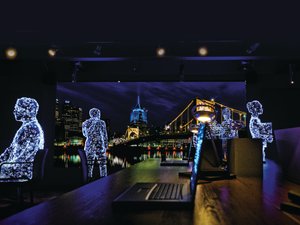
Editor's note: Technological advancements, specifically those in the areas of artificial intelligence (AI) and automation, are changing the way people work — and transforming entire professions. What will the jobs of the future look like? On Dec. 13, 2023, the Pittsburgh Business Times will host “Future of AI in the Workplace,” a breakfast event to examine this very topic. The event will be held at Google Pittsburgh's Bakery Square office in Larimer. A panel discussion will be preceded by a keynote address from Bill Moore, creative senior manager at Boston Consulting Group. This event is SOLD OUT. No walk-in registrations will be accepted.
See insights from the four panelists in the Q&As below.
Jennifer Apicella, executive director, Pittsburgh Robotics Network

Jennifer Apicella is executive director of the Pittsburgh Robotics Network, a nonprofit business advocacy organization that strives to serve as a unifying voice for the region’s budding robotics community. The PRN boasts over 130 membership organizations, which Apicella serves as the de facto cheerleader for as she works to promote the various assets these companies can bring to others not only locally, but also in a national and international capacity as well. Regularly attending industry trade shows and events worldwide, Apicella is a passionate advocate of the pivotal role Pittsburgh plays as the epicenter of robotics innovation, emphasizing the transformative impact it’ll have on the future of work and the evolving landscape of human-technology collaboration.
What is the best way for businesses to take advantage of robotics developments?
They should explore ways they can adopt robotics or use automation in their businesses to become more efficient, to become more competitive and to provide enhanced workforce experiences for their staff, for their employees. A younger generation of workers want to work with technology. They expect to work with technology. And so they will embrace work cultures and work environments that also are embracing technology, too.
What industries do you see becoming more welcoming for robotics in the near future?
The areas that we’re seeing more emerging adoption: Agriculture is huge for that; there are so many areas within agriculture to adopt automation and get a massive ROI, a great benefit. In addition to that, construction is where we’re also seeing a lot of emerging robotics and great impacts. And I would say another one would be transportation, delivery, autonomous trucking, … that last-mile delivery or various forms of on-road mobility.
Why are robotics a worthwhile investment for many different industries?
Well with automation, [it’s] just like [with] software. Once software became something that was more accessible, companies started to see the value because they could do more with less. It removed labor-intensive tasks, repetitive tasks, and allowed them to scale and make smarter business decisions. That same principle is true for intelligent automated machines. Adopting robotics is also going to allow them to do more with less. … Access to talent is one of the major barriers for companies today to figure out: How am I to grow my business if I don’t have a stable workforce or if the workforce I have, they don’t want to do the work because it’s tedious, it’s at all dirty, dangerous tasks, repetitive tasks? What we’re seeing is that robotics is going to allow them to stabilize their operations. It’s going to allow them to do more with less. They’re going to get the ROI from the investment once they adopt. And it’s also going to modernize their business and make them more competitive.
Richard Clarke, chief analytics officer, Highmark Health

In his current role as chief analytics officer at Highmark Health, Richard Clarke is leading all data and analytics across the Pittsburgh health care giant. In recent years, that work has included spearheading efforts within the organization to adopt AI technology in order to increase efficiency and enhance the patient experience. Just this year, he has been overseeing Highmark’s adoption of Google’s Vertex AI Search across its business. In a clinical setting, the technology is being used to supplement patient-provider visits, with the AI listening in on conversations and providing advice in real-time that health care providers might miss. Highmark Health plans to roll out its use at Allegheny Health Network in the coming years.
Could you share any examples where the Google Vertex AI technology has made a significant impact on patient care, efficiency or decision-making?
We are too early in this journey to say we have seen significant impact yet. However, we have a number of pilot projects underway, and the early results are very promising. Within the clinical setting, Allegheny Health Network is very focused on leveraging generative AI to reduce the burden of documentation and enable our clinicians to spend more time with patients during appointments.
How is Highmark Health addressing data and patient privacy concerns in the context of AI adoption, and what measures have been put in place to ensure that sensitive patient data remains protected?
Highmark Health is committed to addressing privacy, security and ethical concerns with respect to any tools we utilize. As generative AI tools have evolved, we immediately implemented governance to protect the use of our member/patient data. Our data governance and privacy protection programs oversee any initiatives using generative AI. We conduct a risk-based assessment of each initiative and a thorough review of the technological architecture that will be used to execute the initiative. Any tool must satisfy our “zero data leakage” requirements to ensure no Highmark data will be exposed outside of our secure environment. This risk-based assessment covers not only privacy and security, but also assesses risk across other dimensions, including risks around ethical concerns and bias.
What emerging AI trends or innovations do you anticipate will have a significant impact on health care organizations in the future?
We believe that AI will be adopted across all business functions within health care, which will completely transform the interactions between people and their clinicians, care teams and insurance companies. It should lead to greater access to care and understandable information, less confusion and bias, and ultimately better outcomes and more affordable care.
Timothy James, software engineering manager, Google

Tech giant Google, known for pioneering search engine technology, is helping to forge the AI path via several tools, including Bard and Vertex AI. Timothy James is a software engineering manager in Google’s Bakery Square office in Pittsburgh, where he works on the Cloud AI Platform team, building user interfaces for AI applications that include Vertex AI, a tool that has recently been adopted by local health care giant Highmark Health. James also is a part-time instructor at the University of Pittsburgh’s Department of Computer Science.
Google Vertex AI technology being deployed at Highmark Health is just one application. Are there any other business/corporate applications you see in Pittsburgh specifically for this tool?
Vertex AI is a platform that supports end-to-end machine learning operations. There are capabilities in the platform to manage data and features, develop models, evaluate models, experiment with models, train both simple and custom models at scale, manage model life cycle, flexibly host models in production, monitor models and orchestrate machine learning pipelines. There are entry points for machine learning experts and opportunities for engineers who are less than experts but want to take advantage of AI in their applications. This makes the platform a great option for a lot of different kinds of businesses — and it includes AI-powered solutions for contact centers, document processing, retail and finance. Pittsburgh has a lot of large companies and employers. AI can unlock opportunities for many kinds of businesses, from models that can help to detect fraudulent transactions, improve/optimize logistics, provide better product suggestions or enhance human capabilities in reviewing/verifying documents. Many applications of AI and machine learning in these ways don’t replace humans — they allow initiates to perform higher-quality work or they provide experts with enhancements that allow them to do more work. In many ways, AI, like any other technology, can make people more efficient and more effective.
What are some best practices for businesses looking to integrate AI into their existing processes?
Start small — try to solve problems in a single use case or application first. Don't try to boil the ocean or even a teaspoon. Understand what's in the teaspoon, and why you're boiling in the first place. What's your objective? How does the model in question help you to meet that objective? What can make it better? What data is necessary? What can cause it to go wrong? How does it affect privacy/security, or the perception of privacy and security?
After that, test and experiment. Evaluate how the model works before putting it into production. Test it offline, but also try testing it in real scenarios before any of its output is used. Have it generate its product after a human operator. This kind of shadow A/B test will allow you to build confidence in the solution, but also will allow you to detect if there are unanticipated problems in a real scenario before it becomes visible or becomes a dependency in your operations.
It can be important to try to break it. Can you generate inputs that allow your solutions to, so to speak, misbehave? Can you "trick" this model into doing something unexpected, or outright bad? Approaching a solution adversarially can also help in identifying issues.
Make sure your team is prepared to work with this type of technology. How do they identify/escalate problems? How do they provide good data? How do they utilize this technology to improve their work? How do they provide suggestions or feedback? It's important to consider all of these steps repeatedly. While your solution may be very capable and effective, the world is constantly changing. Does it effectively keep up to a changing situation? Continuing to evaluate the solution in changing context can be important, and as your applications of these solutions grow, it may be very valuable to establish a team that is responsible for managing the lifecycle and continuing to evaluate these models.
Matthew Johnson-Roberson, director, Robotics Institute, Carnegie Mellon University

As director of the Robotics Institute at Carnegie Mellon University, Matthew Johnson-Roberson is leading the efforts behind modern advancements in the robotics industry. It’s a post he has held since November 2021 and is one that brought him back to his alma mater following his graduation from CMU in 2005. Every day, Johnson-Roberson works with students and faculty members at CMU to convert robotic science fiction into reality, specializing primarily in finding ways to get robots to operate in more complex environments and to do so autonomously. These efforts are leading to machines that are bringing robotics technologies to industrial and societal tasks alike as the institute also frequently partners with government, industry and nonprofit organizations to better understand new ways that robotics can be embedded into the workforce and other aspects of life.
What are some of the more practical use cases for robotics in the workplace today?
Some robots are probably working in simpler environments with not a ton of dynamic activity; they’re focused on everything from security robots that move on preplanned paths to industrial robots that work on assembly lines to office robots that are doing cleaning or delivery. They’re working in somewhat dynamic environments, but they’re trying to keep things pretty simple. And I think that’s primarily where we’re seeing robots deployed now — it’s in environments where they can be safe and be useful and be economical.
How is that likely to change in the next few years?
I think we’re really at this inflection point where we’re seeing AI being deployed on these robot systems to address exactly those challenges: More dynamic environments, more uncertainty, more chaos, more flexibility in what they do, and I think that is going to be sort of explosive in what it allows us to do in terms of expanding the number of applications that robots can really touch. That means that they can do more things more flexibly and probably more intuitively and more intelligently.
How do you think these changes will impact the workforce and people’s way of life in the near term?
I think that ultimately lots of the things that you’re seeing being tested today will be actual integrated parts of the way that we live our lives. Everything from robotaxis that will pick us up and drop us off to domestic robots that will be in our home helping us to clean and cook to robots in the office to robots in the streets doing delivery. … Looking out your window and seeing a robot moving around every day, doing something useful for humanity, that’s really what I hope to get to, that’s why I come to work every day. That’s what I’m trying to do. And I think it’s going to be a big part of what the next hopefully 50 years, if I live that long — I’m only 40 now, but that’s what the next 50 years will be about.









